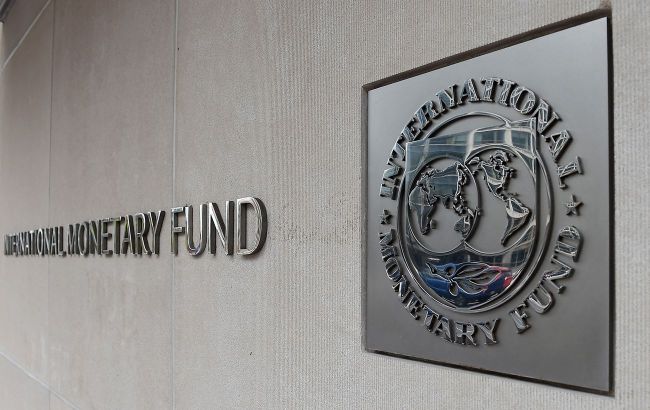Ukraine reached agreement with IMF for $900 million tranche
 Photo: Ukraine agreed with the IMF on a $900 million tranche under the EFF program (Getty Images)
Photo: Ukraine agreed with the IMF on a $900 million tranche under the EFF program (Getty Images)
In Warsaw, from February 17 to 22, negotiations took place between the mission of the International Monetary Fund (IMF) and representatives of Ukraine. The parties reached an agreement on the staffing level for the third review of the Extended Fund Facility (EFF) program, amounting to approximately $900 million. The agreement is pending approval from the leadership of the Fund, according to the IMF website.
It is noted that the staff of the International Monetary Fund and the Ukrainian government have reached an agreement on the Staff-Level Agreement (SLA) regarding the updated package of economic and financial policies for the third review of the 4-year Extended Fund Facility (EFF) program. The agreement is to be approved by the IMF Executive Board, with a review expected in the coming weeks.
As all structural benchmarks and all, except one, quantitative performance criteria were met, the staff assesses the program as overall being implemented in a timely manner. This will pave the way for the Executive Board's consideration of the disbursement of around $880 million (663.9 million Special Drawing Rights).
In 2023, the Ukrainian economy showed a positive trend with high growth rates, inflation reduction, and strengthening reserves. However, the prospects for 2024 remain highly uncertain due to the ongoing war.
"I am pleased to announce that IMF staff and the Ukrainian authorities have reached a staff-level agreement on the third review of the EFF. The agreement is subject to approval by the IMF Executive Board, with Board consideration expected in the coming weeks," stated Gavin Gray, the head of the IMF mission in Ukraine.
Priorities and tasks of Ukraine
The Governor of the National Bank of Ukraine, Andrii Pyshnyi, noted on his Facebook page that the IMF acknowledges Ukraine's progress under the EFF program. All structural benchmarks have been met, and all quantitative performance criteria, except one (due to a slight shortfall in tax revenues caused by border blockades), have been fulfilled.
Pyshnyi stated that Ukraine can count on the next tranche from the IMF. He emphasized that the SLA is subject to approval by the IMF Executive Board (the meeting is scheduled for March). After that, Ukraine will be able to receive the fourth tranche from the Fund, amounting to approximately $880 million.
According to him, in terms of the NBU's performance, IMF experts acknowledged the preservation of macroeconomic stability in the conditions of a state of war, the stability and liquidity of the financial system, and the resilience of the foreign exchange market after transitioning to a managed floating exchange rate regime.
Pyshnyi also mentioned that the NBU will continue to implement structural reforms to maintain macroeconomic stability, support development goals, and move closer to EU accession.
He outlined the main priorities and tasks as follows:
-
Strengthening supervision and the financial security system, deepening the financial market infrastructure, including the payment system. Additionally, resuming regular assessments of stability and, when conditions permit, completing an independent assessment of asset quality.
-
Gradual and cautious easing of currency restrictions under the Strategy for Mitigating Currency Restrictions, transitioning to greater exchange rate flexibility, and returning to inflation targeting. Pyshnyi emphasized that there are no specific dates for lifting particular restrictions and it will happen only when the necessary prerequisites are met.
-
Further mobilization of financing on the domestic debt market. Exploring ways to increase autonomy in covering budgetary needs.
The ongoing full-scale war remains a key risk for the Ukrainian economy and financial system. However, Ukraine has already demonstrated the ability to act decisively and proactively to achieve its goals.
Conclusions of the IMF Mission on the EFF Program
The four-year Extended Fund Facility (EFF) program for Ukraine with access to around $15.6 billion (11.6 billion Special Drawing Rights) was approved in March 2023 and is part of the international support package for Ukraine totaling $122 billion until the beginning of 2027.
The mechanism of extended financing continues to serve as a robust anchor for the government's economic program during times of extremely high uncertainty. The program implementation has been high, despite the challenges of the war - the government met all quantitative performance criteria except for a minor shortfall in tax revenues due to the border blockade, and all four structural benchmarks that needed to be reviewed.
Two years after Russia's invasion of Ukraine, the human and economic consequences of the war continue to grow. The latest Operational Damage and Needs Assessment (ODNA-3) estimates recovery needs at $486 billion. The government has adeptly supported macroeconomic and financial stability, which, coupled with substantial external financing, enabled a stronger-than-expected economic recovery in 2023: growth is estimated at 5 percent with upside risks, amid decreasing inflation and significant reserves. However, the war and delays in external financing negatively impact trust, and it is expected that growth in 2024 will slow to 3-4 percent.
The fiscal financing needs remain very high in 2024, reflecting the pressure on expenditures related to the war. The budget for 2024 remains a short-term anchor for fiscal policy, and in this context, efforts should be focused on ensuring sufficient revenues, defining expenditure priorities, and utilizing liquidity in the domestic market. The government is ready to respond quickly to shocks and has already taken measures to overcome liquidity deficits that arose earlier in the year due to delays in external financing. It is crucial that the timely disbursement of planned external support, projected to be $38 billion in 2024, is critically important for budget financing and macroeconomic stability.
Preparations for the restructuring of external commercial debt are progressing, and it is important to complete it by mid-2024 in accordance with the program parameters. This, along with assurances from creditors and donors in the official sector (regarding the provision of concessional financing during the program period) and medium-term fiscal adjustments based on revenues (based on the recently introduced National Revenue Strategy), will be crucial for restoring debt sustainability.
The foreign exchange market remains generally stable after transitioning to the managed floating exchange rate regime in October 2023. Under this regime, the exchange rate is intended to serve as a shock absorber and safeguard external stability. The relaxation of currency controls is expected to occur cautiously and gradually in accordance with the NBU's strategy.
The financial system remains stable and liquid, although vigilance needs to be maintained due to the uncertainty associated with the war. The recent assessment of the stability by the National Bank of Ukraine and the operational measures to cover the capital deficit have been positive steps in preserving stability. Among the future priorities are strengthening supervision and the financial security system, deepening the financial market infrastructure, including the payment system, and resuming regular assessments of stability, and when conditions allow, completing an independent analysis of asset quality.
The government remains committed to broad structural reforms aimed at preserving macroeconomic stability, supporting development goals, and continuing the path towards EU accession.
The National Revenue Strategy is intended to cement tax policy and administration reforms to facilitate increased revenues necessary for achieving these goals. It is crucial to avoid measures that negatively impact the income base.
Soon, the preparation of the budget declaration for 2025-27 will commence, aiming to reconcile the still substantial expenditure needs with the increasing reliance on internal resources. Additionally, the implementation of medium-term budget planning, combined with reforms in state investment management, will help strengthen the link between national development goals, investment priorities, and available resources.
Fiscal risks, particularly from state-owned enterprises, require careful monitoring to ensure effective use of state resources and maintain debt sustainability, with the Ministry of Finance playing a key oversight role. Enhanced supervision of the subsidized lending program 5-7-9 is necessary to improve targeting given budgetary constraints and limit risks to the financial sector. The proper implementation of the recently enacted corporate governance law will be crucial for strengthening the state-owned enterprises sector.
Recent governance-related reforms, such as the adoption of the law reforming the Specialized Anti-Corruption Prosecutor's Office (SAP) in December 2023, are significant achievements. Supporting the momentum of reforms in this area, such as the creation of a new administrative court, will be crucial for enhancing public trust and garnering donor support for recovery efforts.
History of the EFF Program for Ukraine
On December 11, 2023, the IMF Board of Directors approved the second review of the EFF program with Ukraine and allocated a tranche of $900 million for the program for the years 2023-2027.
The Fund also released an updated memorandum containing voluntary commitments by the country's government to take certain steps.
For more details on the negotiations with the IMF, read the material by RBC-Ukraine titled New tranche and plan B for Ukraine's state budget: What to expect from negotiations with IMF.

